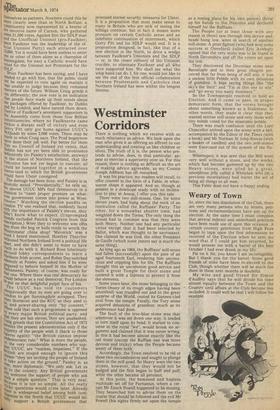Westminster Corridors
There is nothing which we receive with so much reluctance as advice. We look upon the man who gives it as offering an affront to our understanding and treating us like children or idiots. The truth of it is, the person who pretends to advise, does, in that particular, appear to exercise a superiority over us. For this reason, there is nothing so difficult as the art of making advice agreeable, as my Cousin Joseph Addison has oft remarked.
It was his practice, my readers will recall, to offer counsel in the form of a Fable, in whatsoever shape it appeared. And so, though at present in a downcast study with no inclination to play at Aesop, I offer you this tale.
There were two mill-stones. One, for some eleven years, had hung about the neck of an institution called the Ruffians' Party. The other, for a somewhat shorter time, had weighted down the Tories. The only thing the stones had in common was that they were both Heavy. Neither one had any particular virtue except that it had been selected by Ballot, which was thought to be sacrosanct. One claimed he was God, the other President de Gaulle (which some jesters say is much the same thing).
As long ago as 1964, the Ruffians' mill-stone had fallen (successfully) upon the pate of an aged fourteenth Earl, rendering him unconscious and crippling him for life. The Ruffians thought this an uncommon good service and built a great Temple for their stone and covered it with a Gannex to protect it from the elements.
Some years later, the stone belonging to the Tories (many of its rough edges having been smoothed) was trundled out and to the great surprise of the World, ousted its Gannex-clad rival from the temple. Fatally, the Tory stone acquired delusions of grandeur, much as its predecessor had clone.
The fault of the true-blue stone was that whenever it was set down one way, it tended to turn itself upon its head. It started to con verse in the royal "we", would brook no argument and claimed that it was never wrong. In this it had become almost exactly like the red stone (except the Ruffian one was more devious and tricky) when the People became weary of them both.
Accordingly, the Town resolved to be rid of these two encumbrances and sought to plunge them in the mill pond. So Heavy were the two stones, however, that they would not be budged and the first began to huff and puff, while the other became all petulant.
At this point, the bemused and hapless multitude set off for Parnassus, where a cer tain Mr Enoch Powell happened to be musing. They beseeched him to advise them on the course that should be followed and the evil Mr Powell (his sights firmly set upon the temple as a resting place for his own person), threw up his hands to the Heavens and declared himself for the Ruffians.
The People (or at least those with any reason in them) saw through this device and, heads hung low, went in search of another mill-stone. A prize fighter (who had won some success at Oxenford) called Eric Avebury opined that the very stone was to be found in North Devonshire and off the voters set upon the trot.
They discovered the Devonian stone near Barnstaple and to their great chagrin perceived that far from being of mill size, it was a useless little Pebble with its own delusions of grandeur. It kept saying things like "the sky's the limit" and "I'm in this one to win" and "go away you nasty monsters."
So the Townspeople resolved to hold an Election. And it came to pass, in proper democratic form, that the voters brought about something known as a Stalemate. In other words, they made it clear that they • wanted neither mill-stone and only those with tiny minds voted for the miserable pebble.
There was much confusion until the Lord Chancellor arrived upon the scene with a bell. accompanied by the Editor of the Times (with a book) and Mr Norman St John-Stevas (with a basket of candles) and the two mill-stones were Exorcised out of the system of the Nation.
Whereupon, it was seen that the Mill went very well without a stone, and the works, which had become gummed up by the two Heavy stones, were oiled by a great. amorphous jelly called a Whitelaw who (in a previous incarnation) had learnt the art of being all things to all men.
This Fable 'does not have a happy ending.
Weary of Town
So, since the late dissolution of the Club, there are very many persons who by letters, petitions and recommendations have put up for election. At the same time I must complain that several indirect and underhand practices have been made use of upon this occasion. A certain country gentleman from High Peak began to tapp upon the first information he received of the Election when he sent me word that if I could get him returned, he would present me with a barrel of the best October I had ever drunk in my life.
Fie on it Sir, you know I am incorruptible. But I thank you for the barrel. Some good friends of mine have been re-elected to the Club, though whether there will be much fun there in these next months is doubtful.
My wise and good friend Sir Simon d'Audley says that he will divide his time almost equally between the Town and the • Country until affairs at the Club become less occluded. It could well be that I will follow his example.


































 Previous page
Previous page